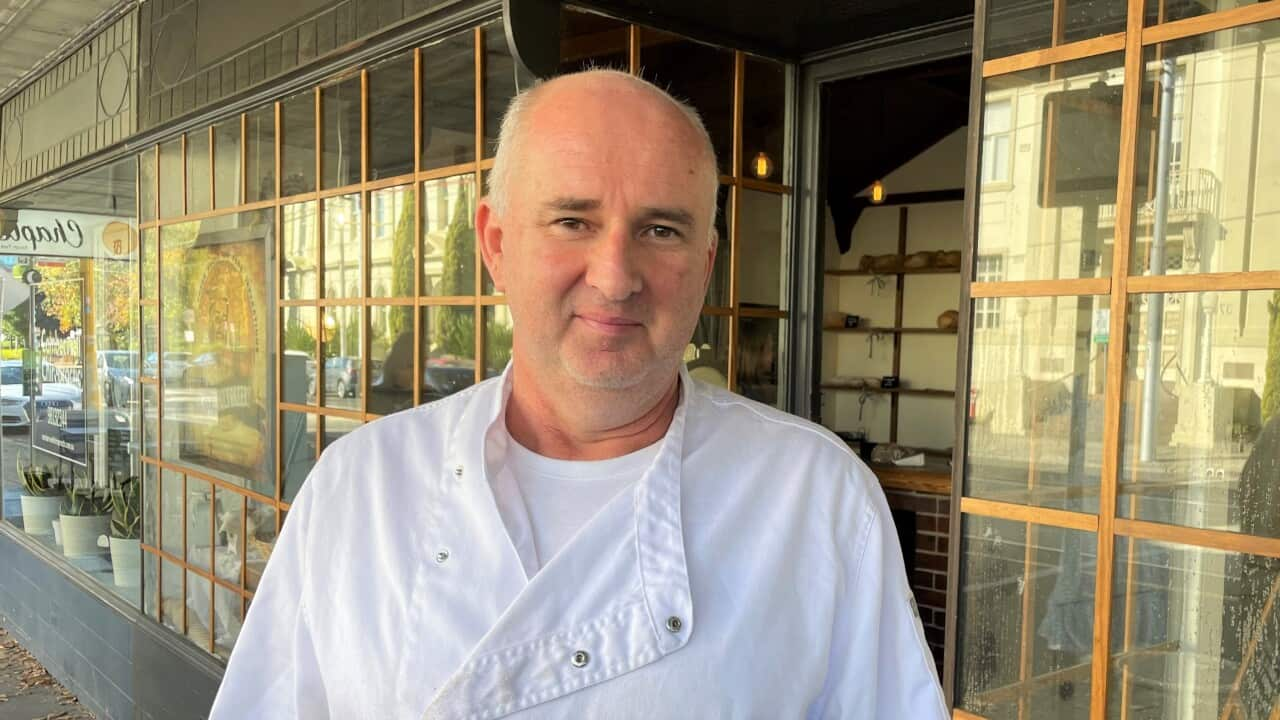Produced in collaboration with SBS Dutch
TRANSCRIPT
“I’d like a fruit loaf please. Sure!”
Walking through the doors of a new bakery in the Melbourne suburb of Camberwell is like stepping back in time.
And that’s because owner Reinier Krol draws on traditions handed down the generations.
“I started baking at a very young age and my father taught me how to bake and obviously his father taught him how to bake and his father taught him how to bake. It's only just been recently since the death of my father that I've come back to baking. And I think perhaps the passing of my father, there was a lot of reflection, especially about family and the importance of family.”
Mr Krol returned to his roots this year after decades at the helm of a film production company.
He opened the small shopfront in April and now rises early in the morning to hand-roll fruit buns, pastries and cookies.
“Most nights I am here somewhere anywhere between one and three AM. But look, you can't open a bakery business and then suddenly be shocked that you have to be here at night. I mean, that's just part of the gig, right? So, my father used to drag me into work in all the school holidays and the weekends. The hard work got instilled in me at a very, very young age, and has always stuck with me.”
Mr. Kroll is a fit looking 51-year-old wearing a white chef's coat while loading the loaves into the oven including his signature sourdough – based on a recipe passed on from his father, Jan.
“My father moved to Australia from the Netherlands with his family in 1982 and he was one of the very first bakers to bake sourdough bread in Melbourne. And she had a starter or a leaven for the sourdough, which we still use today. Sourdough is essentially just a naturally fermented bread. It's basically just flour and water that's allowed to ferment over a certain period of time and that creates a natural sour taste and it also turns into a rising agent. So, it's effectively a natural yeast.”
The Krol Family Bakery sourdough is among its best sellers and has already won a loyal following, as customer Quiana Dong explains:
“I like the vintage feel of the bakery. The apple Danish it's really nice because it’s not too sweet. It tastes like it's homemade not something you buy from the big supermarket.”
It also appeals to the tastes of the local Dutch diaspora, and Mr Krol says customers have come from far and wide.
“We advertised a little bit in the Dutch community and the following day we had people drive four, five hours just to come and get some of the products. It was absolutely unbelievable and people would walk in and they'd go ‘Oh, it smells Dutch’. I mean, I don’t know what smells Dutch, but we had people come in and they had driven from all corners of the state essentially just to sort of discover the place they'd heard about.”
The Krol family baking tradition stretches back more than a century, to the end of World War One when the first outlet opened in the Netherlands.
“In 1918, my great-grandfather moved to a little Dutch town called Spaarndam just west of Amsterdam. He opened a little bakery there and he was essentially helping to rebuild the country and help the community. And he would work in that little shop with his wife. So, my grandfather took over the family business just after World War 2 and it was essentially history repeating itself because the country was once again devastated. Obviously this time in the Netherlands did participate in World War 2 there was a lot of people lost, homeless food was extremely difficult to find. The little bakery had survived the war and he was making breads and I have no doubt helping the community in any way that he could.”
That caring ethos remains active today. Each day’s unsold loaves are gifted to a local support group.
And while living costs may be soaring, Mr Krol has this goal to help his community.
“To make a good quality product, to sell it at an affordable price. The artisan bread market has become so expensive. Most bakeries are charging $10, $11, $12 for a loaf of sourdough bread. Now I understand business costs have gone up along with everybody else's living expenses, but at the same time, bread shouldn't cost 10, $12 a loaf!”
Mr Krol’s artist wife Rachel runs a gallery next door and is happy to serve behind the counter.
“It's really busy in the front, but I actually love it. I haven't had that much experience doing customer service, so it's all a bit new for me, but I've just kind of fallen in love with getting to know everybody.”
And how would Mr Krol’s dad Jan feel about this new venture?
“I think he would be very proud. I think in his own Dutch way he would make some suggestions. He would have some criticisms I'm sure, but he would be very proud.”
In this small business customers are like an extended family but Mr Krol dreams of one day starting a family of his own and training his children in the fine art of baking.
“I'd be very proud to have the fifth generation follow me and teach them how my father taught me and how his father taught him and so on. I think that's quite a special thing. And just like you keep the sourdough starter going over generations, you keep the traditions and the business going over generations. I think that would be a great thing.”













